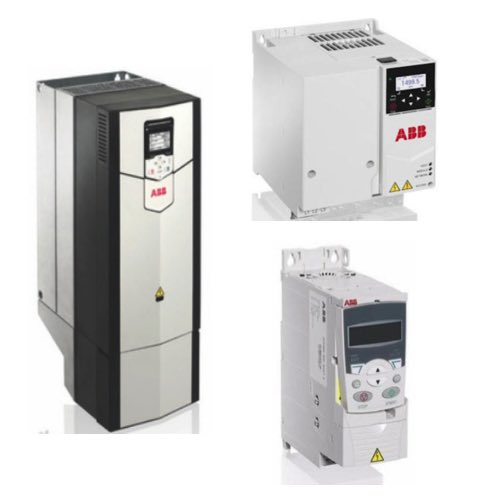
ABB VFDs

ABB drives and variable frequency drives (VFDs) are designed to improve energy efficiency and optimize electric motor performance throughout a wide range of industries. These ABB variable speed drives perform precise control of not only motor speed but also motor torque. And in so doing, they reduce energy consumption and elevate the already high reliability of electric motors in demanding applications.
The water and wastewater applications is an important area where the VFDs manufactured by ABB can make a significant impact. Conducted energy studies show that the most efficient pumps, when coupled with properly designed piping systems, can yield energy savings. ABB is capable of providing VFDs for almost any industry and equips its technology with the intelligence necessary for ensuring optimized system performance. For the pump-and-motor combination to function at peak efficiency, proper design of the impeller is also crucial. ABB has a movement and machine design group that works hand-in-hand with the entity that designs the control algorithms for the VFD. Together, they ensure that the VFD and the pump-and-motor combination using it are engineered to function at peak efficiency.
Products
More Information about ABB Variable Frequency Drives
ABB provides advanced motor control technology to a range of applications, such as data centers, and even the components of smart buildings like HVAC systems. What these applications have in common is that they require some pretty reliable technology to keep everything running smoothly, and if my experience has taught me anything, it's that in order to serve a relevant slice of the market, you need to have your focus primarily on one of three pillars: conservation, automation, or both. ABB's focus happens to be on both these pillars, but with a much stronger emphasis on energy conservation to provide a more sustainable future.
FAQs
Can ABB drives perform in a reliable manner for machine builders in wastewater networks, including cooling towers and water pumps?
Yes, ABB drives can perform in a reliable manner for machine builders in wastewater networks, including cooling towers and water pumps, by providing precise motor control, energy efficiency, and enhanced system reliability in demanding applications.
Motor Starters, Soft Starters and VFDs
Motor Starters
Motor starters safely start and stop a motor in industrial applications. They are designed with a contactor, overload and circuit protection. They are used when basic motor control is required, where torque on the motor is not a concern and speed control is not needed. The advantages of motor starters include: lower cost, allows for remote operation, allows for monitoring of motor state (with the use of auxiliary contacts) and they are safe and efficient. The disadvantages include: high inrush current that can cause fuses to blow and breakers to trip if the inrush is too high, and the starter will allow a full torque to start the motor which can cause the motor to ramp up to full speed very quickly potentially causing the motor to wear and degrade prematurely.
Soft Starters
Soft starters protect motors from inrush current by gently ramping up the motor to full speed. They provide all of the same functions as a traditional motor starter. The advantages of soft starters include: they are less expensive than a VFD when only startup control is needed, they are a smaller system than a VFD where space is a concern and they prevent unwanted torque upon startup, prolonging the life of the motor. The disadvantages include: they are more expensive than a traditional motor starter and they do not allow for full speed control.
VFDs
A Variable Frequency Drive (VFD) allows for the slow ramp up of a motor during startup and the slowing down of the motor during shutdown. It also allows for full speed control during the entire run cycle of the motor. VFDs provide the same functions as both the traditional motor starters and soft starters. The advantages of VFDs include: full speed control (start, stop and in-between), more custom control and monitoring, energy savings due to efficient motor usage and less wear and tear on the motors. The disadvantages include: they are more expensive and larger than other motor control options and they generate heat that may require fans or AC units.

